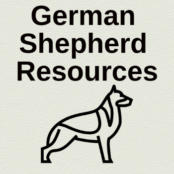Your German Shepherd is more than just a pet; it’s a member of your family, and just like any family member, you want to make sure they are happy, healthy, and well-nourished. A nutritious diet is essential for the well-being of these loyal and intelligent dogs. Here, we’ll explore the top ten foods you should include in your German Shepherd’s diet, not only to keep your GSD full of energy but also to maintain their muscular physique and shiny coat. Of course always check with your vet before changing your dogs diet and after vet approval go slowly to avoid upset tummy.
Table of Contents
Introduction
The German Shepherd is an active and athletic breed, known for its strength and agility. To support their rigorous lifestyle and maintain a strong immune system, it’s vital to provide them with a balanced diet rich in high-quality proteins and essential nutrients. This long-form post will serve as a comprehensive guide for German Shepherd owners, offering insight into the specific dietary needs of these majestic canines and how certain natural foods can fulfill those needs.
Understanding the German Shepherd’s Dietary Caloric Needs
Before we discuss specific foods, it’s important to understand the unique caloric needs of your German Shepherd. Factors such as age, size, and activity level can significantly impact the amount of food they require. Generally, a typical GSD needs about 1,400 to 2,100 calories per day, depending on the aforementioned factors. It’s crucial to consult with your veterinarian to tailor a feeding plan that is ideal for your individual dog.
Lean Meats
German Shepherds thrive on lean meats due to their high protein content, which is essential for muscle development and supporting an active lifestyle. Here are some meats that are excellent sources of protein and relatively low in fat:
Chicken (Cooked and Boneless)
Chicken is an easily digestible protein that can be a staple in your GSD’s diet. Remember to cook it thoroughly and remove the bones, as cooked bones can splinter and cause internal injuries.
Turkey (Without Skin)
Like chicken, turkey is a lean protein option for your GSD. Be sure to avoid feeding them the skin, which is high in fat and can cause digestive issues.
Beef (Low Fat)
It’s a common misconception that all beef is high in fat. Lean cuts of beef can be an excellent source of protein for your GSD. Look for cuts labeled ’round,’ ‘loin,’ or ‘sirloin.’
Fish
Fish is not only a great source of protein but also provides omega-3 fatty acids, which are beneficial for your dog’s skin and coat.
Salmon (Source of Omega-3 Fatty Acids)
Including salmon in your GSD’s diet can help reduce inflammation and improve joint health, especially for older dogs.
Sardines (Small Amounts to Avoid Heavy Metals)
Due to the risk of heavy metal contamination, it’s best to offer sardines as an occasional treat.
Whole Grains
Whole grains are complex carbohydrates that provide a slow release of energy, making them a great source of fuel for your GSD’s active lifestyle. They also contain essential B vitamins, iron, magnesium, and fiber.
Brown Rice
Brown rice is a gluten-free grain that is gentle on your GSD’s digestive system and helps regulate blood sugar levels.
Oats
Oats are a nutritious and easily digestible grain that can be beneficial for dogs with sensitive stomachs.
Barley
Barley is rich in fiber, which can help your GSD feel fuller for longer and support their digestive health.
Vegetables
Including vegetables in your GSD’s diet can provide a range of vitamins and minerals. They are also a natural source of fiber, which aids in digestion.
Carrots (Good for Their Teeth)
Carrots are a low-calorie, high-fiber snack that can help clean your GSD’s teeth and provide relief for teething puppies.
Green Beans (Low Calorie)
Green beans are a low-calorie, stringy vegetable that keeps your GSD feeling full without adding excessive calories.
Pumpkin (Helps With Digestion)
Pumpkin is a powerhouse food that can help regulate your GSD’s digestive system, particularly if they have issues such as diarrhea or constipation.
Fruits
Fruits are a fantastic source of natural sugar, vitamins, and antioxidants for your GSD. In moderation, they can be a tasty and nutritious addition to their diet.
Apples (Without Seeds)
Apples are a low-calorie fruit rich in vitamin C and fiber. Be sure to remove the seeds, which contain cyanide and can be toxic.
Blueberries (Antioxidants)
Blueberries are packed with antioxidants, which can help prevent cell damage and support your GSD’s overall health.
Bananas (In Moderation Due to Sugar Content)
Bananas are high in potassium and can make a great occasional treat. Due to their sugar content, they should be given in moderation.
Eggs
Eggs are a powerhouse of nutrition, containing high-quality protein, essential amino acids, and numerous vitamins and minerals.
Bone Health
Eggshells can also be ground up and sprinkled into your GSD’s food to provide natural calcium for strong bones.
Legumes
Legumes are an excellent source of plant-based protein and can be particularly beneficial for GSDs with allergies to traditional meat sources.
Cooked Lentils (Fiber and Protein)
Lentils are high in fiber and protein, making them a nutritious addition that promotes digestive health.
Chickpeas (Avoid Canned With Added Salt)
Chickpeas are a versatile legume that can be served whole or mashed. Avoid those with added salt, particularly if your GSD has a heart condition.
Healthy Fats
Incorporating healthy fats into your GSD’s diet can enhance the taste of their food and support their overall health, including a shiny coat and healthy skin.
Flaxseed (Omega-3 for Coat)
Flaxseed is an excellent source of omega-3 fatty acids, which can help reduce shedding and maintain a luscious coat.
Coconut Oil (Skin Health)
When given in moderation, coconut oil can provide a range of benefits, from supporting the immune system to improving skin health.
Supplements
While a balanced and varied diet should provide most of the nutrients your GSD needs, certain supplements may be beneficial, especially for senior dogs or those with specific health concerns.
Glucosamine (For Joint Health)
Supplementing with glucosamine can help maintain healthy joints and reduce the risk of arthritis, which is common in older GSDs.
Fish Oil (For Coat Shine and Health)
If your GSD’s coat is looking a little dull, a fish oil supplement can provide the omega-3 fatty acids needed for a shiny and healthy coat.
Summary
Feeding your German Shepherd a diet consisting of the mentioned nutritious foods can lead to a long and healthy life. However, it’s important to remember that while these foods are beneficial, moderation is key. Always consult with a veterinarian before making any significant changes to your GSD’s diet, and monitor their weight and health regularly. With a balanced approach to nutrition, you can ensure that your German Shepherd enjoys a life full of vitality and joy.

